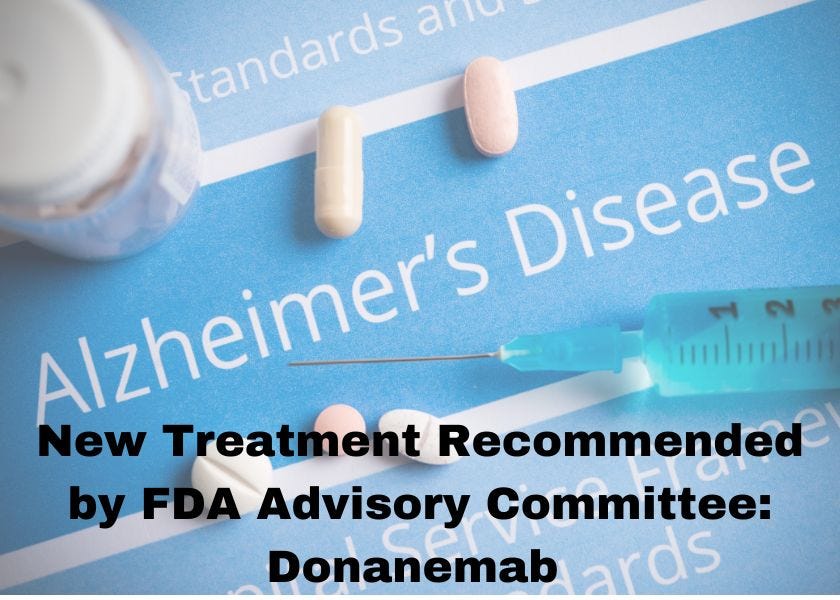June 16, 2024: new drug approvals; telehealth fraud and ADHD drugs; FDA sued over ignoring citizen petition to update side effects; PCOS study; vaccines as cancer treatment
New Alzheimer Drug Recommended for Approval
An FDA advisory committee unanimously recommended (11-0) that the FDA should approve Eli Lilly's Alzheimer's drug donanemab, even with only moderate evidence that it slows symptoms of the disease. The committee found donanemab to be effective in the population enrolled in the clinical trials, which excluded patients with low to no tau (abnormal neurofibrillary protein tangles in the brain).
https://www.fiercebiotech.com/biotech/lillys-donanemab-sails-through-fda-meeting-unanimous-votes-favor
The FDA approved diabetes drug Farxiga (dapagliflozin) for younger patients age 10 and up with Type-2 diabetes.
https://www.pharmexec.com/view/fda-approves-farxiga-improve-glycemic-control-pediatric-patients-diabetes
The FDA expanded the use of Regeneron and Sanofi's Kevzara (sarilumab) for the treatment of pediatric patients weighing at least 63 kg (138 pounds) with active polyarticular juvenile idiopathic arthritis (pJIA), a form of arthritis that impacts multiple joints at a time. The weight minimum is because of lack of an appropriate dosage amount.
https://investor.regeneron.com/news-releases/news-release-details/kevzarar-sarilumab-approved-fda-treatment-active-polyarticular
Aucta's seizure drug Motpoly XR (lacosomide) is now approved for use in children and adults weighting at least 110 pounds for partial-onset seizures and primary generalized tonic-clonic seizures.
https://www.accessdata.fda.gov/drugsatfda_docs/label/2024/216185s001lbl.pdf
Drug Approval Process
Scientists are debating whether the FDA allows too many drug approvals based on "surrogate data endpoints" instead of disease improvement. It can take several years for a drugmaker to conduct a clinical trial to prove the worth of a medicine. But proxies, or "surrogate endpoints," can be achieved much faster, and the FDA is increasingly using them as the basis for accelerated approvals of drugs. For example, the Alzheimer's drug lecanemab (Leqembi) was approved in 2023 based initially on the surrogate marker of reducing amyloid in the brain. Another "surrogate marker" has been blood pressure readings.
https://www.fiercepharma.com/marketing/evidence-doesnt-support-fdas-use-surrogate-markers-accelerated-approvals-report
Alleged Telehealth Fraud – ADHD Drugs
The U.S. Department of Justice (DOJ) arrested the founder and top clinical leader of Done Health, a large subscription-based telehealth company. The DOJ alleges that they exploited the COVID-19 pandemic to develop and “carry out a $100 million scheme to defraud taxpayers and provide easy access to Adderall and other stimulants for no legitimate medical purpose." A nationwide Adderall shortage was announced in October 2022, and DOJ said the business contributed to the shortage, hurting patients with legitimate medical needs. The CDC issued a related announcement, saying that the company’s disruption could impact as many as 30,000 to 50,000 of Done’s patients age 18 and older across all 50 U.S. states.
DOJ Press Release
https://abc7chicago.com/post/adhd-medication-shortage-done-global-arrests/14949167/
FDA Sued for Ignoring Citizen Petition
Howard University scientist Antonei Csoka sued the U.S. Food and Drug Administration for failing to act on a six-year-old petition seeking a warning label for two classes of common antidepressant drugs, selective serotonin reuptake inhibitors (SSRIs) and serotonin-norepinephrine reuptake inhibitors (SNRIs). The citizen petition was filed by 22 scientists in May 2018, represented by Public Citizen Litigation Group, urging the agency to require that the drug label include a warning that sexual side effects can persist after the drugs are discontinued. Currently, the labels only warn that these effects can happen during use. Examples of SSRIs are Lexapro (ESCITALOPRAM OXALATE), Zoloft (SERTRALINE) , and Prozac (fluoxetine) and SNRI drugs include Cymbalta (DULOXETINE) and Effexor XR (VENLAFAXINE).
https://www.reuters.com/legal/litigation/fda-sued-by-scientist-urging-sexual-side-effects-warning-widely-used-depression-2024-05-20/
Vaccines as Medicine
Moderna, in partnership with the drug firm Merck, is conducting mid- to late-stage clinical trials of a cancer-preventing vaccine across five kinds of cancer. This case study in Nature describes how skin cancer patient Angela Evatt underwent an experimental procedure that not only removed cancerous tissue from her back, but harvested her unique mutant proteins, known as neoantigens, in order to develop a personalized mRNA-based vaccine that could attack any tumour cells left behind after the procedure. The procedure was completed in 2020, and the cancer has not returned.
https://www.nature.com/articles/d41586-024-01717-x
Antimalarial Drug Reduces PCOS Symptoms in Small Study
Artemisinin, a dietary supplement derived from Artemisia plants, is used as a treatment against malaria, lupus and cancer. A small research study suggests that the compound could also be used to alleviate symptoms of PCOS (polycystic ovarian syndrome). Researchers at Fudan University in Shang Hai demonstrated that artemisinins can relieve the endocrine manifestations of polycystic ovarian syndrome in multiple rodent models and in a 19-member study of human patients with PCOS. In the human trial, after taking the artemisin-type drug three times a day for three months, 12 of the patients began having regular menstrual cycles, and most of the patients had lower blood testosterone levels and fewer developing follicles in their ovaries.
While the results are promising, Sireesha Reddy, an obstetrician and gynecologist at Texas Tech University Health Sciences Center El Paso, cautions that the results are very preliminary and need to be replicated by other researchers. The study was published in Science.
https://www.sciencenews.org/article/malaria-drug-treat-pcos-hormone-disorder
Statins Eligibility Study
In November 2023, the American Heart Association (AHA) updated its equations for predicting the risk of cardiovascular disease events, which it calls the "Predicting Risk of Cardiovascular Disease Events" (PREVENT) equations. It was reported that the updated guidelines could mean that fewer adults will meet the eligibility criteria for primary prevention statin therapy. Recently, a study led by University of Pittsburgh Department of Medicine applied the new guidelines to patient data from 3,785 adults who were 40 to 75 years old and took part in the National Health and Nutrition Examination Survey from January 2017 to March 2020.
Researchers found that the number of adults recommended for statins could drop from 45.4 million to 28.3 million. The study also found that under the new assessments, most people who would be advised to take them aren’t doing so now. The study was published in JAMA Internal Medicine. Under the current guidelines, most people with a 10-year risk of 7.5% or more for developing cardiovascular disease are advised to take a statin, while at a 5% risk, they’re told only that they and their doctors should consider doing so. Stat interviewed Steven Nissen, a cardiologist at the Cleveland Clinic, who was not part of the study, who has been leading an effort in collaboration with AstraZeneca to make its 5-milligram dose of rosuvastatin, available over-the-counter without a prescription.
Nissen said, “Good medicine involves judgment. And the calculator is not a replacement for good medical judgment, which may come to a different conclusion,” he said. “I’m not very supportive of either calculator because I think that in general, it’s good to have a lower LDL,” or “bad” cholesterol.
https://www.statnews.com/2024/06/10/cardiovascular-disease-statins-aha-guidelines/
You may try out the AHA calculator to assess your risk of cardiovascular disease based on AHA criteria, but you’ll need quite a bit of data to complete the form. If you have had a recent physical, including a blood panel, you will have most of what you will need to calculate your score.
Are you taking a statin drug to treat your high cholesterol? Check out MedShadow Foundation's special report on statins. It includes an explanation of why statins are prescribed, how they affect people differently, side effects, possible drug interactions, and alternatives.
https://medshadow.org/statins-need-to-know/
Patient reviews for common statin treatments:
Rosuvastatin Reviews
Atorvastatin Calcium Reviews
Simvastatin (brand name Zocor) Reviews
Drug Safety Labeling Updates
Usually, less than 30 FDA drug safety label updates are added each month, but in just the last two weeks (since our last issue on June 2), a whopping 55 labels were updated! Many of them were for corticosteroids, so we devoted one of this week's "Drug Safety Label Updates" to that category. Other notable label updates were for several multiple sclerosis (MS) drugs (Gilenya,fingolomod, Mayzent, Zeposia), Parkinson’s drug Mirapex ER, and lymphoma treatment Calquence .
Corticosteroids Safety Updates (June 2024) This post was also emailed to subscribers.
MS Drug Safety Labeling Updates (June 2024)
Men's Health Tips
Happy Fathers Day and also Happy Men's Health Month! Check out this series of podcasts from University of Utah called "Who Cares About Men's Health." Hosted by "The Who Cares Guys" emergency physician Dr. Troy Madsen, The Scope producer Mitch Sears, and senior producer Scot Singpiel, these are three regular guys just trying to live a healthy life without it taking over their lives. During each 20 minute program, they bring in health experts and talk about common men’s health issues.
Recent programs include:
Episode 174: The Lowdown on Testicular Lumps - When to Worry and What to Do
and “Top 5 Ignored Men’s Health Threats.”
Check out all the episodes:
https://healthcare.utah.edu/the-scope/mens-health/all

Check out our website at www.askapatient.com to read or add patient experiences with medications and common vaccines.


